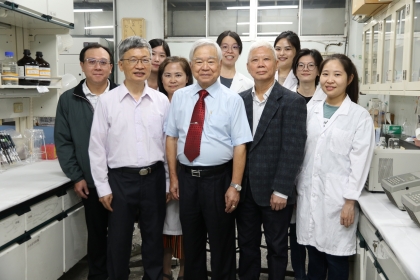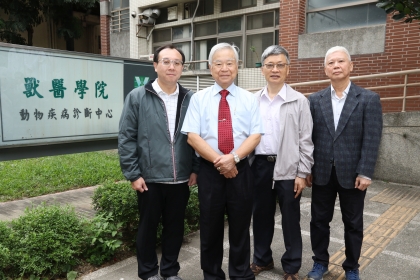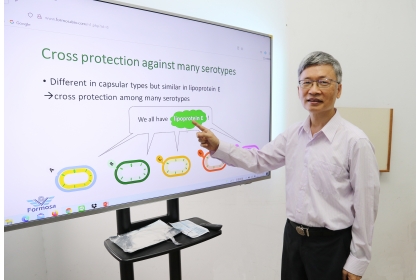Taiwan's Animal Vaccine Marketed Internationally National Chung Hsing University Veterinary Team Won the Outstanding Technology Transfer Contribution Award from Ministry of Science and Technology
2021-12-10 09:32:43
興新聞張貼者
Unit秘書室
2,012
The animal vaccine developed in Taiwan is marketed internationally. The fowl cholera vaccine developed by the team of College of Veterinary Medicine, National Chung Hsing University (NCHU) is currently the world's only fowl cholera subunit vaccine. This technology has been transferred to Formosa Biomedical Inc., and the vaccine was mass-produced and launched in 2015. The company was approved by National Chung Hsing University last year (2020) to add the authorized overseas sales territories including ASEAN countries, Russia, Ukraine, South Korea and Egypt. NCHU team won the Outstanding Technology Transfer Contribution Award from Ministry of Science and Technology this year.
It took 15 years for the vaccine to go from domestic research and development to export to foreign countries. Fowl cholera is characterized by high morbidity and high mortality, and is one of the top killers of poultry. In 2005, Professor H.-K. Shieh of College of Veterinary Medicine of National Chung Hsing University called to organize a research team, investing in the development of vaccines. Professor Poa-Chun Chang from Graduate Institute of Microbiology and Public Health and Professor Jui-Hung Shien from the Department of Veterinary Medicine jointly acted as the advisors of Dr. Jing-Ru Wu (a doctoral student at that time) to supervise Dr. Wu’s research on using genetic engineering and molecular biology methods to find the key component PlpE. Recombinant DNA method was used to produce subunit vaccines, and then animal experiments were conducted. The vaccine was formally developed successfully in 2008. In the same year, the technology was transferred to Formosa Biomedical Inc., and the vaccine successively obtained the patent of Republic of China, the patent of United States, and the veterinary drug license of Republic of China. This vaccine began to be mass-produced and launched in 2015. Recently it has been widely used in the prevention and treatment of cholera in ducks, geese and colored chickens and fowls, officially launched to foreign markets in 2020.
As Professor H.-K. Shieh stated, there are about 100 million chickens and 40 million geese and ducks raised in Taiwan every year. Fowl cholera is a highly infectious disease of domestic fowl and wild fowl, probably leading to acute septic disease with high morbidity and high mortality, and sometimes causing chronic infections. The pathogen is Pasteurella multocida, which mainly invades and infects poultry through the eye and nose. Various poultry may be infected. The infection rate and mortality are higher in adult poultry near the saleable stage. Most of them will die within one day after being infected, resulting in a huge impact on the industrial economy.
Professor Poa-Chun Chang pointed out that the vaccine developed by the National Chung Hsing University team is characterized by subunit components. Traditional vaccines are made from whole bacteria, which contain bacterial endotoxins and other toxic substances, and which produce bad side effects after being injected into the animal body. Besides, there are serotype limitations. The subunit vaccine uses PlpE, an effective component in fowl cholera bacteria. This component exists in different serotypes, so the subunit vaccine can produce good cross-protection. It does not use whole bacteria, with less toxins and higher safety. Coupled with the production by genetic engineering methods, the vaccine manufacturing costs can be reduced.
Professor H.-K. Shieh said, “The traditional whole-strain vaccine has limited protection. The subunit vaccine breaks through the serotype limit whereby the protection can be greatly improved. Especially Southeast Asia is dominated by waterfowl. Only one infection in a pond is easy to cause infection in the whole pond. European and American countries mainly raise turkeys. Their demand for demand for fowl cholera vaccine is high. This vaccine is very competitive in the international market.”
The research and development team of College of Veterinary Medicine, NCHU developed animal vaccines, having not only effectively assisted farmers with prevention from epidemics but also brought benefits to the development of the local animal vaccine industry. Through development of the international market, it is expected that annual sales will increase in the future, thereby helping the development of the local biotechnology industry. The team of Professor H.-K. Shieh especially thanked Ministry of Science and Technology of the Executive Yuan and National Chung Hsing University for their long-term support for this project. They also encouraged more young students to devote themselves to the research and development of animal or human vaccines. In the future, they will surely be able to find a stage where they can give full play to their strengths.
It took 15 years for the vaccine to go from domestic research and development to export to foreign countries. Fowl cholera is characterized by high morbidity and high mortality, and is one of the top killers of poultry. In 2005, Professor H.-K. Shieh of College of Veterinary Medicine of National Chung Hsing University called to organize a research team, investing in the development of vaccines. Professor Poa-Chun Chang from Graduate Institute of Microbiology and Public Health and Professor Jui-Hung Shien from the Department of Veterinary Medicine jointly acted as the advisors of Dr. Jing-Ru Wu (a doctoral student at that time) to supervise Dr. Wu’s research on using genetic engineering and molecular biology methods to find the key component PlpE. Recombinant DNA method was used to produce subunit vaccines, and then animal experiments were conducted. The vaccine was formally developed successfully in 2008. In the same year, the technology was transferred to Formosa Biomedical Inc., and the vaccine successively obtained the patent of Republic of China, the patent of United States, and the veterinary drug license of Republic of China. This vaccine began to be mass-produced and launched in 2015. Recently it has been widely used in the prevention and treatment of cholera in ducks, geese and colored chickens and fowls, officially launched to foreign markets in 2020.
As Professor H.-K. Shieh stated, there are about 100 million chickens and 40 million geese and ducks raised in Taiwan every year. Fowl cholera is a highly infectious disease of domestic fowl and wild fowl, probably leading to acute septic disease with high morbidity and high mortality, and sometimes causing chronic infections. The pathogen is Pasteurella multocida, which mainly invades and infects poultry through the eye and nose. Various poultry may be infected. The infection rate and mortality are higher in adult poultry near the saleable stage. Most of them will die within one day after being infected, resulting in a huge impact on the industrial economy.
Professor Poa-Chun Chang pointed out that the vaccine developed by the National Chung Hsing University team is characterized by subunit components. Traditional vaccines are made from whole bacteria, which contain bacterial endotoxins and other toxic substances, and which produce bad side effects after being injected into the animal body. Besides, there are serotype limitations. The subunit vaccine uses PlpE, an effective component in fowl cholera bacteria. This component exists in different serotypes, so the subunit vaccine can produce good cross-protection. It does not use whole bacteria, with less toxins and higher safety. Coupled with the production by genetic engineering methods, the vaccine manufacturing costs can be reduced.
Professor H.-K. Shieh said, “The traditional whole-strain vaccine has limited protection. The subunit vaccine breaks through the serotype limit whereby the protection can be greatly improved. Especially Southeast Asia is dominated by waterfowl. Only one infection in a pond is easy to cause infection in the whole pond. European and American countries mainly raise turkeys. Their demand for demand for fowl cholera vaccine is high. This vaccine is very competitive in the international market.”
The research and development team of College of Veterinary Medicine, NCHU developed animal vaccines, having not only effectively assisted farmers with prevention from epidemics but also brought benefits to the development of the local animal vaccine industry. Through development of the international market, it is expected that annual sales will increase in the future, thereby helping the development of the local biotechnology industry. The team of Professor H.-K. Shieh especially thanked Ministry of Science and Technology of the Executive Yuan and National Chung Hsing University for their long-term support for this project. They also encouraged more young students to devote themselves to the research and development of animal or human vaccines. In the future, they will surely be able to find a stage where they can give full play to their strengths.




